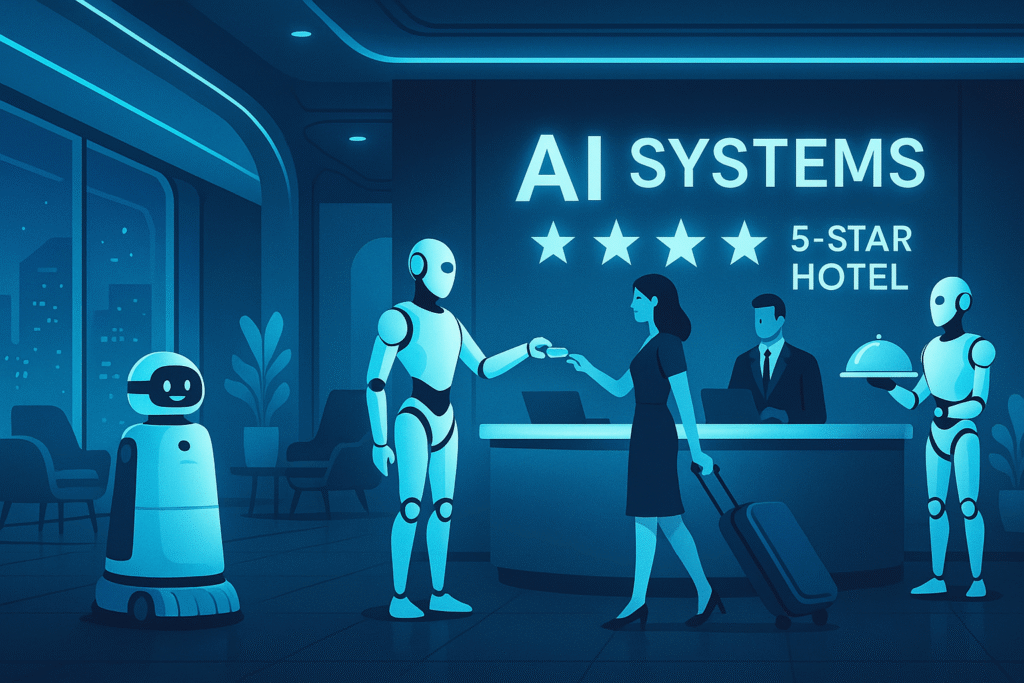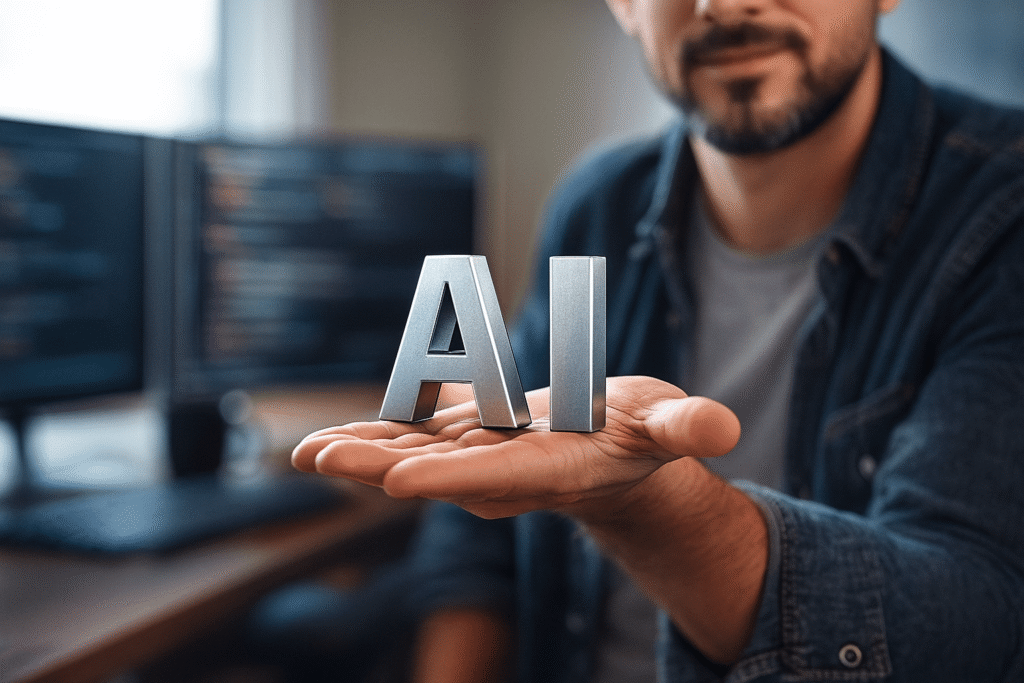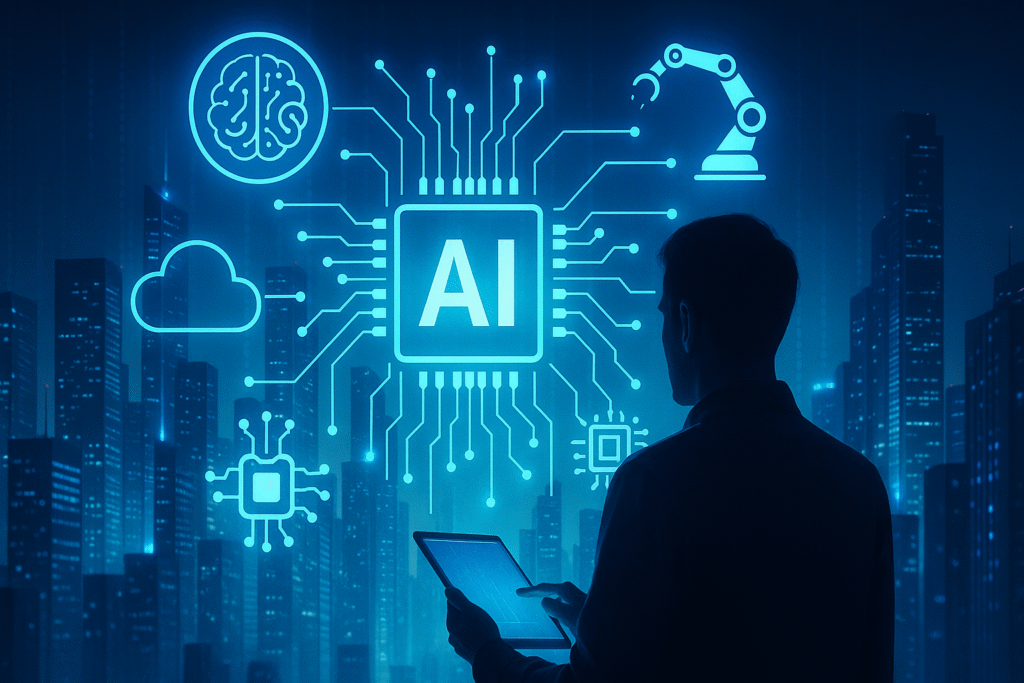AI in the Hospitality Industry

Imagine walking into a hotel where check-in takes seconds, your favorite drink is already waiting in your room, and the concierge knows your plans before you even ask. This isn’t a scene from a sci-fi movie — it’s the new reality possible with artificial intelligence.
The hospitality industry is no stranger to high expectations, but with labor shortages, rising costs, and increasingly demanding guests, the pressure has never been greater. That’s where AI steps in: not just as a tool for efficiency, but as a game-changer that redefines how hotels, resorts, and restaurants deliver unforgettable experiences.
Table of Content
What Is the Current State of the Hospitality Industry?
The hospitality industry thrives on delivering exceptional hotel guest experiences, yet it’s currently facing some of its biggest challenges in decades. Labor shortages continue to plague hotels and restaurants, driving up wages while leaving many properties understaffed. At the same time, rising operational costs, from energy consumption to supply chain disruptions, are eating into already thin profit margins.
On the customer side, expectations have shifted dramatically. Guests now demand faster service, hyper-personalized experiences, and seamless digital interactions that match the convenience of e-commerce and travel apps. Traditional hospitality methods — manual check-ins, static pricing, and reactive service — can no longer keep up with these new standards and market trends.
Adding to the complexity is the need for global competitiveness. Hospitality brands aren’t just competing with the hotel next door; they’re up against international chains and tech-driven platforms that use data and automation to attract and retain customers. In this landscape, embracing innovation isn’t optional; it’s the only way to remain relevant.
Use Cases: Where AI Technologies Add Value in Hospitality
AI is transforming how leading hotels, resorts, and restaurants operate. By integrating AI into both guest-facing services and behind-the-scenes operations, hospitality businesses can unlock efficiencies, improve satisfaction, and gain a competitive edge.
Personalized Guest Experience
Hospitality has always been about personal touch, but AI takes personalization to a whole new scale and enhances guest experiences tenfolds.
- AI-powered chatbots act as digital concierges, offering 24/7 service in multiple languages, handling everything from room service requests to local dining recommendations. Unlike traditional call desks, these bots can instantly process thousands of requests simultaneously.
- Predictive personalization means the system “remembers” guest habits: the traveler who always orders a vegan breakfast will find one pre-suggested; the guest who books a late checkout will get reminders before their next stay.
- In-room AI assistants (like smart speakers or voice-controlled systems) allow hotel guests to adjust lighting, order amenities, or request information hands-free, making the room itself part of the hospitality experience.
Operational Efficiency
AI shines in optimizing the complex hospitality operations that guests never see but always feel the effects of.
- Automated check-in/check-out systems reduce long queues at reception, freeing staff to focus on higher-value interactions.
- Housekeeping optimization uses predictive analytics to assign staff more effectively, ensuring rooms are cleaned and turned over faster without overburdening employees.
- Predictive maintenance powered by sensors and AI models can detect when air conditioners, elevators, or appliances are likely to fail, fixing issues before they inconvenience guests and streamlining hotel operations.
Revenue Management
Pricing rooms and services has always been a delicate balance, but AI makes it scientific.
- Dynamic pricing engines analyze demand, competitor rates, local events, weather, and even flight data to adjust prices in real time.
- Hotels using AI-based revenue management systems report higher occupancy rates and improved RevPAR (Revenue per Available Room) compared to traditional methods.
- Restaurants can leverage AI to optimize menu pricing by analyzing dish popularity, ingredient costs, and seasonal demand, maximizing both profitability and guest satisfaction.
Hospitality Marketing and Customer Engagement
AI helps hotels and hospitality brands move from generic campaigns to highly targeted, data-driven strategies.
- Guest segmentation powered by AI ensures offers are personalized — frequent spa visitors get wellness packages, while business travelers are nudged toward loyalty upgrades.
- Sentiment analysis of guest reviews and social media mentions provides real-time feedback, helping management adjust services before negative experiences spread widely.
- AI-driven chat marketing tools can engage potential guests during booking, offering upsells or personalized discounts at exactly the right moment.
Safety and Security
Guest safety and trust are fundamental, and AI enhances both.
- Contactless solutions like AI-powered facial recognition for check-in reduce touchpoints and speed up entry while maintaining security.
- Smart surveillance systems can detect unusual behaviors in lobbies or restaurants, alerting staff before issues escalate.
- In F&B operations, AI monitors kitchen compliance with hygiene standards, using computer vision to track handwashing, glove usage, and food storage practices.
How to Measure the ROI of AI in the Hotel Operations
Investing in AI can feel like a leap, especially for hospitality businesses already managing tight budgets and razor-thin margins. The key to making AI adoption sustainable is being able to measure its impact clearly. That means looking beyond hype and focusing on metrics that tie directly to profitability, guest satisfaction, and long-term competitiveness.
Key ROI Metrics to Track
- Operational Savings: AI automates repetitive tasks like check-ins, housekeeping schedules, and maintenance alerts. Hotels that deploy AI-powered kiosks or predictive maintenance systems can cut down staff overtime costs and reduce unplanned equipment failures. For restaurants, AI-driven ordering and kitchen monitoring can cut waste and improve efficiency.
- Revenue Growth: Smart pricing engines adjust rates in real time based on demand, local events, or competitor pricing. Hotels using AI for revenue management often see significant increases in RevPAR (Revenue per Available Room). Restaurants, too, can benefit by dynamically pricing menus or tailoring promotions for higher conversions.
- Guest Satisfaction Scores: AI improves customer service by reducing friction — shorter wait times, personalized services, and more relevant recommendations. Tracking NPS (Net Promoter Score), CSAT (Customer Satisfaction), or online review ratings post-AI implementation provides a clear picture of impact.
- Efficiency Gains: By streamlining workflows, AI cuts down the time staff spend on administrative tasks, freeing them for value-added service. Examples include faster resolution of guest requests via chatbots or optimized staff scheduling. Efficiency can be measured in reduced service times, higher occupancy turnover, and quicker response rates.
- Employee Productivity: Rather than replacing staff, AI enables them to focus on tasks requiring human empathy and creativity. Measuring output per staff member, like how many requests are handled per shift or how much upselling occurs during guest interactions, shows how AI can empower rather than displace employees.
Long-Term ROI Benefits
- Loyalty & Retention: Personalized guest experiences encourage repeat bookings, which are far more cost-effective than constantly acquiring new customers. AI-powered loyalty programs and tailored promotions increase lifetime value.
- Brand Differentiation: Hospitality companies that advertise AI-powered features (like smart rooms or frictionless check-in) position themselves as modern, tech-forward brands. This attracts younger, tech-savvy travelers and helps stand out in a crowded marketplace.
- Scalability: Once implemented, AI systems can scale without requiring proportional increases in staff or resources. For example, a chatbot can handle 1,000 requests as easily as 10, whereas human staff cannot scale at that pace without costs ballooning.
- Sustainability: AI also drives savings through smarter energy use (adjusting HVAC and lighting to occupancy) and reducing food waste in restaurants. These not only save money but also strengthen a brand’s ESG (Environmental, Social, and Governance) reputation, a growing factor in guest choice.
Case Studies and Real-World Examples of AI in Hospitality
AI is no longer just a concept in hospitality — it’s being actively used by global brands to enhance service and optimize operations.
key to making AI adoption sustainable is being able to measure its impact clearly. That means looking beyond hype and focusing on metrics that tie directly to profitability, guest satisfaction, and long-term competitiveness.
Hilton – Connie, the AI Concierge
Hilton Hotels partnered with IBM to launch Connie, the world’s first Watson-enabled hotel concierge. Connie can greet guests, provide information about hotel amenities, recommend local attractions, and answer common questions in real time. This experiment showed how AI can complement staff by delivering faster, more consistent service while adding a memorable tech-forward touch to the guest experience.
Marriott International – AI-Driven Revenue Management
Marriott has been a frontrunner in applying artificial intelligence to revenue management. Their machine-learning systems analyze demand patterns, competitor pricing, seasonality, and even event schedules to optimize room rates. This AI-driven approach helps the chain improve occupancy levels, maximize revenue, and stay competitive in a crowded market.
Challenges and Concerns of AI Integration within the Hotel Industry
AI can help hospitality, but the road to adoption is not without obstacles. From ethical dilemmas to financial hurdles, businesses must approach integration with clear strategies and realistic expectations.
Data Privacy and Guest Trust
AI systems rely heavily on personal and behavioral data, from browsing history on booking sites to biometric information used for facial recognition check-ins. While this enables hyper-personalized service, it raises big questions:
- Regulatory pressure: GDPR (Europe), CCPA (California), and other data protection laws impose strict rules on how guest data can be stored and processed. Non-compliance can mean hefty fines.
- Perception gap: Guests may enjoy AI-driven personalization (e.g., room temperature set to their liking) but feel uneasy about how much the hotel “knows” about them. Transparency and opt-in options are essential to maintain trust.
- Solution: Be transparent — explain what data is collected and why, implement strict security protocols, and give guests opt-in/opt-out choices.
High Implementation Costs
Cutting-edge AI solutions don’t come cheap.
- Upfront investment: Installing smart kiosks, predictive maintenance sensors, or advanced CRM systems requires significant capital, which is difficult for independent hotels or small chains.
- Hidden costs: Beyond installation, there are ongoing licensing fees, software updates, cybersecurity needs, and training expenses.
- ROI concerns: While AI can boost efficiency, the payback period may be longer than expected, especially in markets with thin margins.
- Solution: Start small — pilot AI in high-impact areas (like chatbots or dynamic pricing) before scaling. Look for SaaS or subscription-based AI tools to spread costs.
Balancing Human Touch with Automation
One of the defining features of hospitality is emotional connection. AI algorithms risks eroding that if deployed poorly.
- Guest experience trade-offs: A chatbot may answer a request instantly, but it cannot empathize with a frustrated traveler whose flight was canceled.
- Brand identity risk: Premium hotels differentiate themselves through personal service. Over-automation could undermine that positioning if guests feel treated like transactions rather than valued visitors. The best integrations complement human service rather than replace it.
- Solution: Use AI for repetitive, time-consuming tasks, freeing staff to focus on empathy-driven guest service. Position AI as a support tool, not a replacement.
Workforce Displacement and Training
AI introduces fears of job loss, particularly for front-desk, reservation, and call center roles. But the reality is more nuanced:
- Job shifts, not pure losses: Staff will likely move into roles that require problem-solving, relationship management, and oversight of AI systems.
- Upskilling challenge: Employees may need digital literacy training to interact effectively with AI tools. Without investment in retraining, staff morale may decline, fueling resistance to adoption.
- Cultural adjustment: Unions and employee advocacy groups often push back against automation, requiring management to navigate sensitive negotiations.
- Solution: Offer retraining programs and frame AI as a way to make jobs easier, not redundant. Engage employees early in the rollout process to build buy-in.
Integration Complexity
AI tools rarely work in isolation — they need to sync with booking engines, property management systems (PMS), payment gateways, and loyalty platforms.
- System incompatibility: Many hotels, especially legacy chains, operate on outdated tech infrastructure. Plugging in AI can require costly overhauls.
- Data silos: If systems don’t integrate, valuable insights get trapped, undermining AI’s effectiveness. For example, a CRM may track guest preferences, but if that data doesn’t flow to housekeeping systems, the personalization never reaches the guest.
- Downtime risks: Integration missteps can lead to outages, errors in billing, or lost reservations — problems no guest will forgive.
- Solution: Invest in modular AI solutions that integrate via APIs. Work with vendors experienced in hospitality tech and phase integration to minimize disruptions.
Guest Acceptance and Inclusivity
Even if the technology works perfectly, it doesn’t mean every guest will embrace it.
- Tech comfort gap: Digital natives may love facial recognition check-ins or app-based keyless entry, but older or less tech-savvy travelers may feel alienated.
- Cultural sensitivities: In some markets, biometric technologies may be seen as invasive or culturally inappropriate.
- Accessibility concerns: Hotels must ensure AI systems are designed inclusively, offering alternatives for guests with disabilities or those who prefer traditional interactions.
- Solution: Always provide alternatives — AI should be an option, not a mandate. Ensure accessibility for less tech-savvy guests and compliance with inclusivity standards.
Ethical and Reputational Risks
AI can raise ethical red flags if not carefully monitored:
- Bias in algorithms: Recommendation engines might unintentionally favor certain guest profiles over others, leading to perceived discrimination.
- Surveillance backlash: Overuse of cameras and AI monitoring may feel like “Big Brother” to guests, damaging brand reputation.
- Overpromising: Marketing AI features as futuristic “magic” but delivering clunky, frustrating tech can hurt credibility more than help it.
- Solution: Audit algorithms regularly for bias, avoid excessive monitoring, and market AI features realistically. Establish an AI ethics policy to guide deployment.
How TurnKey Can Help Hospitality Brands Build AI Dev Teams
AI integration in hospitality isn’t just about adopting the latest technology — it’s about having the right team to design, build, and implement solutions that actually move the needle. That’s where TurnKey Tech Staffing comes in.
Custom-Recruited AI Talent
Every hospitality business has unique needs, whether it’s predictive revenue management, AI-powered chatbots, or advanced personalization engines. TurnKey doesn’t pull from a “bench” of generic developers — we custom recruit AI engineers, data scientists, and machine learning specialists from the top 3% of talent in Eastern Europe and Latin America, so you get a perfect fit for your project.
Seamless Integration with Your Existing Team
AI projects require collaboration between your internal staff and external specialists. TurnKey developers integrate directly into your team’s workflows, communication channels, and culture, working as a natural extension of your business, not an outsourced “vendor.”
Retention That Protects Your Investment
AI development is long-term and knowledge-intensive. Losing a key developer mid-project can stall innovation and waste resources. TurnKey’s industry-leading retention program reduces developer churn by over 50% compared to the industry average, ensuring continuity and stability for your AI initiatives.
Transparent and Cost-Effective Model
We give you full visibility into developer salaries and service fees. This cost-plus model keeps you in control of compensation while reducing overhead compared to traditional hiring or inflated offshoring contracts, so you can invest more in scaling AI solutions across your business.
Legal Protection and Administrative Simplicity
Hiring globally for AI talent can introduce compliance headaches. TurnKey’s Hybrid Employer of Record (EoR) model handles all legal, tax, payroll, and compliance risks, while assigning full IP rights to you. That means your AI models, algorithms, and data remain 100% yours.
⚡ In short: If you want to bring AI into your hospitality business, you don’t need to build a team from scratch or gamble on high turnover. With TurnKey, you get elite AI talent, low churn, full transparency, and zero legal risk, all integrated seamlessly into your operations.
Hire the best AI developers with TurnKey
Summing Up: What Is the Future of AI in Hospitality?
AI is no longer a distant concept in the hospitality sector — it’s here, shaping how hotels, resorts, and restaurants deliver service, manage operations, and compete in a fast-changing market. From personalized guest experiences to smarter revenue management and predictive maintenance, AI is proving its value across every corner of the industry.
But integration doesn’t come without challenges. Data privacy concerns, high costs, the need for seamless system integration, and maintaining the human touch are all real hurdles. The good news? Each of these challenges has practical solutions, and businesses that address them early will be the ones to gain the most from AI adoption.
At its core, AI isn’t about replacing people; it’s about enhancing hospitality with smarter tools so staff can do what they do best: deliver memorable, human-centered experiences. For hospitality leaders who embrace this balance, AI isn’t just a competitive advantage; it’s the future of the hospitality industry.
FAQ
Artificial intelligence in hospitality is applied across multiple areas: chatbots for 24/7 guest support, dynamic pricing engines for smarter revenue management, predictive maintenance to reduce downtime, and personalization tools that tailor room settings, dining options, and recommendations to individual guests.
Not entirely. AI takes over repetitive, low-value tasks, like check-ins or answering common questions, so staff can focus on delivering meaningful, human interactions. Rather than replacing people, AI helps create a more efficient balance between technology and personalized service.
No. While big brands like Hilton and Marriott have been early adopters, smaller hotels and boutique properties are starting to use SaaS-based AI tools for chatbots, marketing automation, and smart booking systems. By starting small and scaling gradually, even mid-sized operators can benefit from AI without breaking the budget.
Generative AI can create personalized content such as tailored travel itineraries, dining recommendations, or marketing campaigns for individual guests. By using generative AI, hotels can go beyond standard automation and deliver improved guest experiences.
TurnKey Staffing provides information for general guidance only and does not offer legal, tax, or accounting advice. We encourage you to consult with professional advisors before making any decision or taking any action that may affect your business or legal rights.
Tailor made solutions built around your needs
Get handpicked, hyper talented developers that are always a perfect fit.
Let’s talkPlease rate this article to help our team improve our content.
Here are recent articles about other exciting tech topics!




